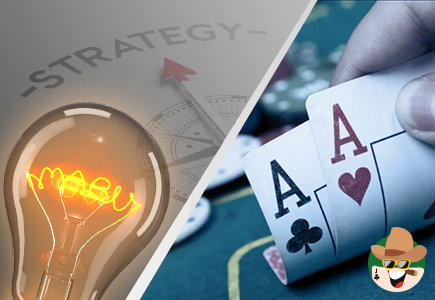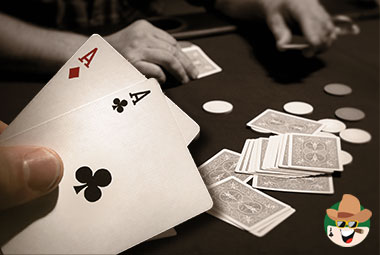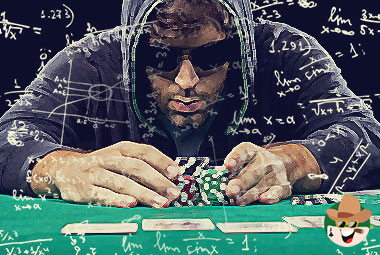

When I first played Texas Holdem in the early 1970s, nobody -- and I mean nobody -- knew much about the game.
We were all stud and draw players. We frequented the card rooms in Southern California and Las Vegas, and played low-ball and draw with a joker.
Then, one day:
The card rooms began spreading this new game where players were dealt only two cards.
The game was simple, delightful and confusing!
Any two cards, we reasoned, could turn into a full house or trips. We flocked to the game like blackbirds to a field of ripe corn. The Holdem craze was off and running.
For a couple of months, I played Holdem with NO strategy, and I was as successful as most of the other players - meaning sometimes I won...
...but more often I lost.
I would put my money in the pot with a seven-deuce offsuit and pray for a hit, which generally did not come. All of us learned the old-fashioned way - by playing the game.
Then the strategy books started coming. They were written by the game's oldtimers -- people like Doyle Brunson, Johnny Chan, Phil Hellmuth, T.J. Cloutier, Daniel Negraneau and others.
Today there are hundreds of strategy books on the market as well as the Internet. Beginning poker players are exposed to knowledge that it took veteran poker players years to learn.

Some of the information is good and some of it is not so good. It all depends on WHAT the author is willing to share and HOW good of a student you happen to be.
- These books and the Internet can teach you:
- odds
- probability
- starting hands
- expected value and...
...a lot more!
They are written by people who are experts on math and probability, and they are worth paying for.
Regardless of how long you have been playing poker, there is a basic strategy you cannot ignore if you want to win at Holdem.
Your strategy begins, of course, with your starting hands. What two cards should you back with money in a game?
It all begins with position
If you are in early position (seats one, two or three), you should limit your starting hands to AA, KK, Q, AK, AQ, or AJ, preferably suited.
If you are in seats four, five or six, you can add JJ, 10 10, 9-9, 8-8 and A-10 to your starting hands. In seats seven, eight or nine, you can play any pair, as well as connected cards like 10-9 or 9-8 suited.
When I say 'play,' I am referring to an unraised pot. If a pot is raised or re-raised, the warning lights should flash and you should realize the other players are trying to tell you something. When you ignore those signals, you are doing so at your own peril.
If you are in a gambling mood and have a lot of chips...
...you will probably want to test your luck by calling with the above stated hands. There will be a lot of money going into the pot and you just might get a miracle flop!
You should follow my example, and spend your first hour or two at the table analyzing the other players:
1. Are they aggressive or passive, calling stations or maniacs?
2. Do they follow up a raise with a bet eve if they don't improve their hand?
3. How do they play the flop and fourth street?
4. Will they fold on the river to a bet or a raise?
These are the questions you should ask yourself before deciding how far to go with your hand.
Above all
Keep in mind that a poker game is supposed to be fun! Money is important, of course, because winning money is the ultimate object of the game.
But if you are having a miserable experience trying to win, this may be game you should not be playing. Good luck with your strategy. Shuffle the cards and let the games begin.
Author: Geno Lawrenzi Jr.
(Geno Lawrenzi Jr. is an international journalist, magazine author and ghostwriter and poker player who lives in Phoenx, AZ. He has published 2,000 articles in 50 magazines and 125 newspapers. If you want to share a gambling story or book idea with him, send an email to glawrenzi@gmail.com ).





